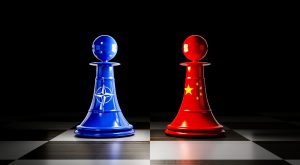The Diplomat author Mercy Kuo regularly engages subject-matter experts, policy practitioners, and strategic thinkers across the globe for their diverse insights into U.S. Asia policy. This conversation with Professor Julian Lindley-French – chairman of The Alphen Group, senior fellow at the Institute of Statecraft in London, and author of 12 books and numerous publications – is the 369th in “The Trans-Pacific View Insight Series.”
How does NATO’s Strategic Concept on China reflect Europe’s concerns about the China challenge?
First, China has an increasingly important presence in Europe – for good and ill. The level of espionage and other unfriendly activities in which China is engaged in Europe has grown exponentially in recent years. As such, China is no longer a trusted partner.
Second, any power that adversely affects the United States adversely affects NATO and European defense. Implicit in the NATO alliance is the need to keep the U.S. strong militarily where it needs to be strong in return for the U.S. security guarantee to Europe.
How has Russia’s war on Ukraine impacted NATO’s strategic calculus vis-à-vis China and more broadly, the Indo-Pacific?
It has become ever more self-evident to Europeans that what happens in Europe affects the entire world and vice versa. Europeans cannot simply stop the world and get off. Chinese support for Russia in its war of aggression against Ukraine has caused a lot of concern that China is not so much interested in globalization as China-ization. Human rights abuses and the unilateral abandonment of the 1997 Basic Law agreement with the U.K. [over Hong Kong] (one country, two systems) has caused very significant concerns about the trajectory of future Chinese foreign, security, and defense policy.
Explain the geopolitical implications of NATO’s engagement with Japan in setting up a representative office in Tokyo.
The strategic partnership between NATO and Japan is underpinned by the new Tokyo office. It is part of an emerging global community of democracies focused on the G-7 but enabled by NATO that is designed to deter autocratic regimes both implicitly and explicitly. It does not mean a global NATO but a NATO fully aware of its place in the 21st century world order.
Evaluate the effectiveness of Euro-Atlantic alignment in coordinating a collective response to the China-Russia partnership.
Only the Americans, British, French, and to some extent mercantilist Germans have a worldview that drives alignment. However, the threat posed by Russia to NATO’s eastern flank and the growing economic presence of China in the Middle East and North Africa, China’s debt coercion, and Beijing’s scientific-military interest in the Arctic is leading to a reassessment by all Europeans about over-reliance on Chinese dominated supply chains. This will lead to the progressive “Western-shoring” of critical resources and requirements over time (micro-chips, rare earth metals).
Identify three key threat vectors that could challenge NATO’s strategic engagement with the Indo-Pacific.
NATO’s strategic engagement in the Indo-Pacific is likely to get stronger, not weaker, because the alliance is one flank of an implicit U.S.-centric global patchwork (AUKUS, U.K.-Japan defense treaty) of security relationships with Indo-Pacific democracies on the other flank. However, I can see three potential threats:
- A Chinese attack on Taiwan would likely see some NATO allies siding militarily with the U.S., others not (although the actual assistance they could render would be minimal).
- The U.S. becomes involved in a major war in the Indo-Pacific, requiring the NATO allies to offset the transfer of U.S. forces and resources away from Europe.
- China “infiltrates” NATO by using debt to force certain member nations to block alliance decision-making.
In conclusion, it is China’s trade relationship with the West that has done much to make China a putative superpower since 1989. However, President Xi’s abandonment of many of the principles and attitudes that underpinned the globalization from which China has so clearly benefited risks turning China from trade partner into strategic adversary. From a mere glance at the figures, China will lose any such contest with the West – both the old West and the global community of democracies into which the West is fast evolving.













